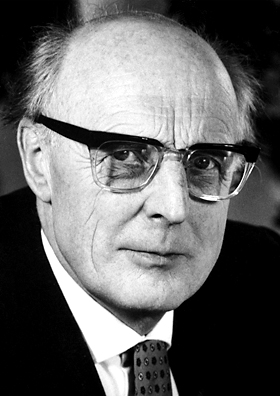J. Hans D. Jensen (nonfiction): Difference between revisions
(Created page with "thumb|Johannes Hans Daniel Jensen.'''Johannes Hans Daniel Jensen''' (25 June 1907 – 11 February 1973) was a German nuclear physicist...") |
No edit summary |
||
| (2 intermediate revisions by the same user not shown) | |||
| Line 1: | Line 1: | ||
[[File:Johannes_Hans_Daniel_Jensen.jpg|thumb|Johannes Hans Daniel Jensen.]]'''Johannes Hans Daniel Jensen''' (25 June 1907 – 11 February 1973) was a German nuclear physicist. | [[File:Johannes_Hans_Daniel_Jensen.jpg|thumb|Johannes Hans Daniel Jensen.]]'''Johannes Hans Daniel Jensen''' (25 June 1907 – 11 February 1973) was a German nuclear physicist. | ||
During World War II, he worked on the German nuclear energy project, known as the Uranium Club, in which he made contributions to the separation of uranium isotopes. | During World War II, he worked on the German nuclear energy project, known as the ''Uranverein'' (Uranium Club), in which he made contributions to the separation of uranium isotopes. | ||
After the war Jensen was a professor at the University of Heidelberg. He was a visiting professor at the University of Wisconsin–Madison, the Institute for Advanced Study, Indiana University, and the California Institute of Technology. | After the war Jensen was a professor at the University of Heidelberg. He was a visiting professor at the University of Wisconsin–Madison, the Institute for Advanced Study, Indiana University, and the California Institute of Technology. | ||
Jensen shared half of the | In 1963 Jensen shared half of the Nobel Prize in Physics with [[Maria Goeppert-Mayer (nonfiction)|Maria Goeppert-Mayer]] for their proposal of the nuclear shell model. The remaining half of the prize was awarded to [[Eugene Wigner (nonfiction)|Eugene Wigner]] for unrelated work in nuclear and particle physics. | ||
== In the News == | == In the News == | ||
| Line 13: | Line 13: | ||
== Fiction cross-reference == | == Fiction cross-reference == | ||
* [[Crimes against physical constants]] | |||
* [[Gnomon algorithm]] | |||
== Nonfiction cross-reference == | == Nonfiction cross-reference == | ||
External links | * [[Maria Goeppert-Mayer (nonfiction)]] - shared Nobel Prize | ||
== External links == | |||
* [https://en.wikipedia.org/wiki/J._Hans_D._Jensen J. Hans D. Jensen] @ Wikipedia | * [https://en.wikipedia.org/wiki/J._Hans_D._Jensen J. Hans D. Jensen] @ Wikipedia | ||
[[Category:Nonfiction (nonfiction)]] | [[Category:Nonfiction (nonfiction)]] | ||
[[Category:People (nonfiction)]] | [[Category:People (nonfiction)]] | ||
[[Category:Physicists (nonfiction)]] | [[Category:Physicists (nonfiction)]] | ||
Latest revision as of 05:38, 7 July 2023
Johannes Hans Daniel Jensen (25 June 1907 – 11 February 1973) was a German nuclear physicist.
During World War II, he worked on the German nuclear energy project, known as the Uranverein (Uranium Club), in which he made contributions to the separation of uranium isotopes.
After the war Jensen was a professor at the University of Heidelberg. He was a visiting professor at the University of Wisconsin–Madison, the Institute for Advanced Study, Indiana University, and the California Institute of Technology.
In 1963 Jensen shared half of the Nobel Prize in Physics with Maria Goeppert-Mayer for their proposal of the nuclear shell model. The remaining half of the prize was awarded to Eugene Wigner for unrelated work in nuclear and particle physics.
In the News
Fiction cross-reference
Nonfiction cross-reference
- Maria Goeppert-Mayer (nonfiction) - shared Nobel Prize
External links
- J. Hans D. Jensen @ Wikipedia

